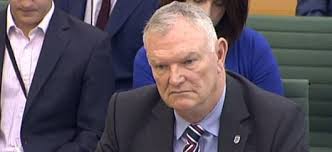October 27 – Under-fire English Football Association chairman Greg Clarke (pictured) has admitted his organisation has “lost the trust of the public” over its handling of discrimination claims made against former England women’s manager Mark Sampson.
Earlier this month Clarke and other English football bosses apologised unreservedly to former internationals Eniola Aluko and Drew Spence for racial comments made to them by Sampson after a re-opened investigation – which originally found no evidence of discrimination – concluded that Sampson, subsequently sacked for “inappropriate and unacceptable” behaviour with female players in a previous job, did indeed make remarks deemed “discriminatory on grounds of race”..
The FA was recently described as “shambolic” at a parliamentary inquiry and Clarke now admits: “We failed. What the last few weeks have exposed is how out of step we are.”
Pledging to conduct a “full cultural review, top to bottom”, Clarke told a meeting of the FA’s council: “Even when our endeavours and attitudes are well meant we fall short.”
In his speech, published on the FA’s website, Clarke promised his organisation would put in place “whistleblowing or grievance procedures” by December to allow individuals to come forward with complaints.
“Let me be clear why this is a problem. We have lost the trust of the public, the trust of the football participating community and the trust of those domestic and international partners we need to do our job.
“This is not my assertion – the evidence is there. Our own insight tracking shows that only 27% of football fans think we are competent and even less, 24%, have a positive perception of the FA. We do need that trust – it is the bedrock of everything we should be about.”
Aluko, who has won 102 caps for England, claimed Sampson told her to make sure her Nigerian relatives did not bring the Ebola virus to a friendly against Germany at Wembley in 2014. She said she felt “vindicated and relieved” by the final report into her claims but accused English football’s governing body of having an agenda to protect Sampson and its own reputation.
Sampson has denied all claims of discrimination both to Aluko and to Spence, a mixed-race player whom he allegedly asked how many times she had been arrested.
Clarke says his appearance before the parliamentary inquiry, along with FA chief executive Martin Glenn and technical director Dan Ashworth, was “a bruising personal experience and the culmination of a very damaging episode for the organisation”.
“We recognised the mistakes we had made, and hoped we could demonstrate our good intentions in how we had addressed an undeniably serious set of allegations. We failed.
“We will conduct a full cultural review, top to bottom, with a focus on improving inclusivity and our collective care for players. Performance and a positive culture must not be an either/or choice.”
“This is going to be the FA, doing what it has failed to do in the past, and getting its own house in order, asking itself some fundamental questions to ensure it can be the best organisation it can be – and to begin to restore that lost trust.”
Not everyone, though, is happy for those responsible for the debacle to stay in their jobs. Lord Herman Ouseley, chairman of anti-racism group Kick It Out, said it was “inconceivable that the people who botched the first investigation are still in their posts.”
“The FA must reflect on the dilemma it now faces as a result of last week’s shambolic exposure of its leadership, competence and discriminatory treatment of black and minority ethnic people. It will not be easy to rebuild trust and confidence,” he said.
Contact the writer of this story at moc.l1713989985labto1713989985ofdlr1713989985owedi1713989985sni@w1713989985ahsra1713989985w.wer1713989985dna1713989985

